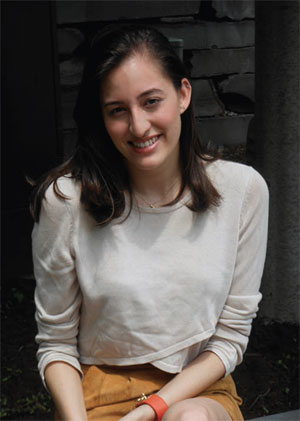This is just one article from CAM’s Summer Reading Special! Click the link to read the entire section.
I didn’t want to write a thesis; I wanted to have written one.

Waxing poetic: Lianne Bornfeld ’15
Many students do an undergraduate thesis for the sake of departmental honors, since cum laude status is often contingent upon it. For others, a thesis is a dry run for a PhD dissertation. But for me—who raced into the world twenty days early, has never bailed on a game of Monopoly, and has been known to make a contest out of late-night snacking—it was all about the challenge.
So at the beginning of my junior spring, in true Millennial fashion, I announced on Facebook that I would write a thesis. I envisioned all the charming posts to come, such as an Instagram of me perusing the library stacks like a brainy-but-adorable character in a John Hughes film. I thought of the photo I’d post of my finished thesis, its esoteric title splashed across the cover.
What I didn’t think about was the part where I actually sat down and wrote the thing.
I began, like most of my peers in the English honors program, by boasting about my grand plans: how I’d finalize my topic by the end of junior year, read all of the pertinent criticism that summer, and steadily labor throughout senior year to finish it.
As it turns out, I wildly underestimated how wrong things can go—how spectacularly, beautifully, randomly wrong. My summer was consumed by an internship. I got mono. I fell behind. I got depressed about falling behind. There was a boy.
By late February I still had no thesis, no research, not even a clear topic. With a month and a half until the deadline, I cracked open Sylvia Plath’s Ariel and annotated every poem in the collection like my life—or, since the thesis accounted for eight credits, my diploma—depended on it.
At that point, all I knew was that I loved poetry, Sylvia Plath, formalism, and feminism. But the magical thing about writing a thesis is that’s all you really need to get started: something that you’re passionate about. From there, a more specific focus somehow unearths itself. Your job is to brush the silt off of it.
Every day for three weeks, I wrote two pages. The more I wrote, the more my ideas crystallized and the faster the pages came. Once I was about twenty-five pages in, the terror of not finishing fell away, and what I intended to be a fifty-page study became closer to ninety.
I ate every meal with my thesis, blew off friends for my thesis, fell asleep with my thesis, frequently fought with my thesis. For all intents and purposes I was dating my thesis, and he wasn’t always a stand-up guy. My diet dwindled to three basic food groups: tuna melts, fish sticks, and coffee. For all intents and purposes I was dating my thesis, and he wasn’t always a stand-up guy.
It all came to a head during spring break. Not only did my laptop die—luckily, I e-mailed the thesis to myself with its last breath—but the lack of sleep, eyestrain, stress, and lousy diet combined to cause a bit of a health scare. And by “a bit” I mean, “a doctor said I might have adrenal cancer.” Even after I found out I was fine, it took me a while to calm down enough to polish off the last ten pages.
So what did I write about? Even the short version is a mouthful, laden with academic jargon like “dichotomy subversion” and “existential multiplicity.” But in sum, I argue that Plath’s original manuscript of Ariel was an allegory for the Greek mythological conception of the life cycle—and that her husband, Ted Hughes, undermined the work’s essential optimism when he published a radically altered version after her death.
But what I’ve learned from writing a thesis goes way beyond any scholarly value. As much as it’s a grand intellectual pursuit, it’s a personal one as well. The process illuminated who I am under pressure, how I work, how I think, where I do it best, and why I do it at all. The whole experience was incredibly validating; it showed me that I’m the kind of woman who does things not because I must, but because I can.
And you can bet I eventually posted that Facebook photo of the finished product, esoteric title and all.


